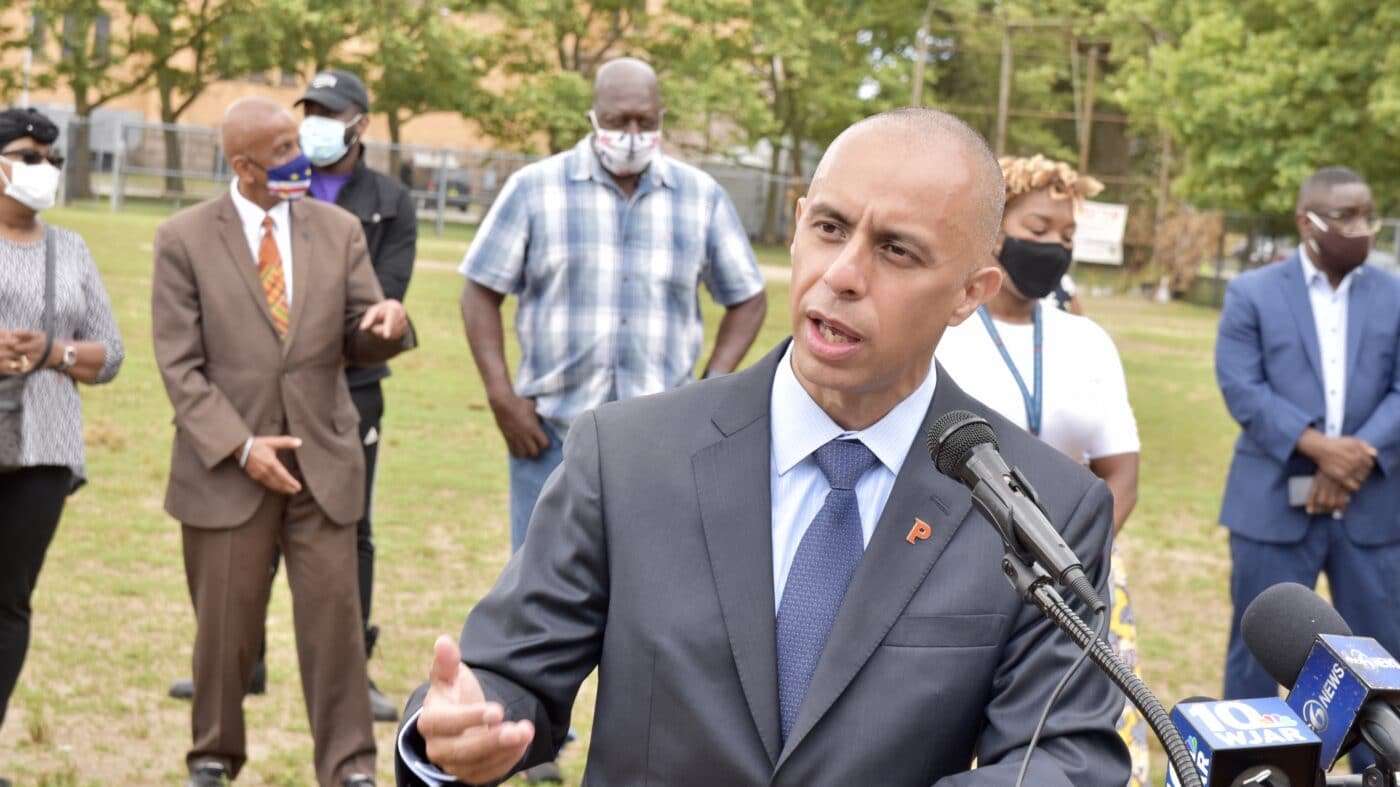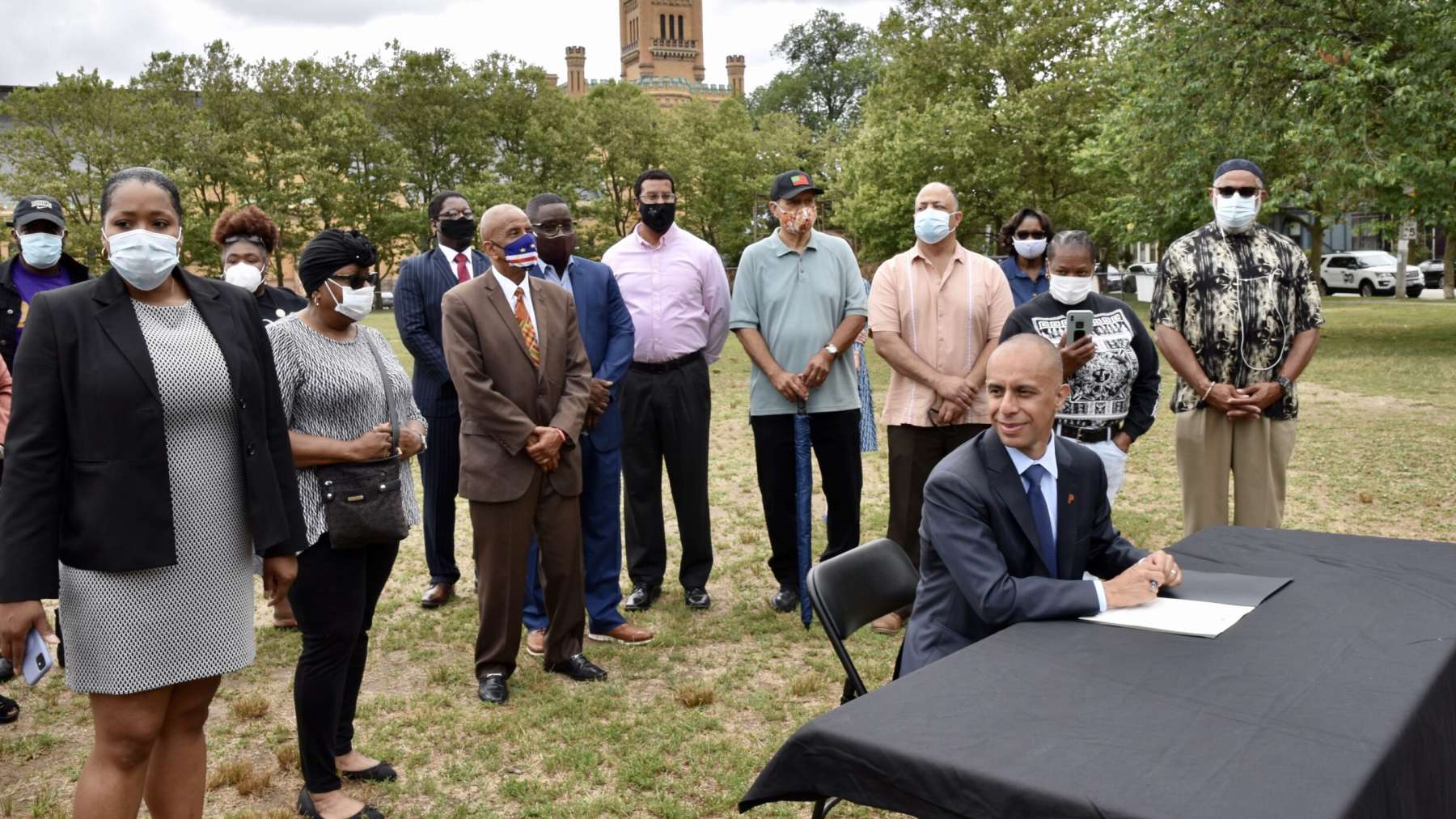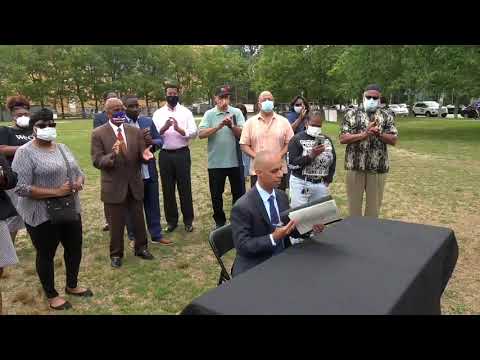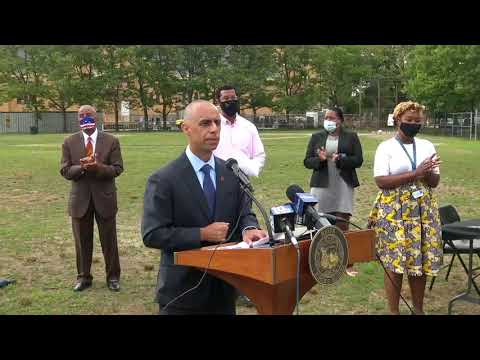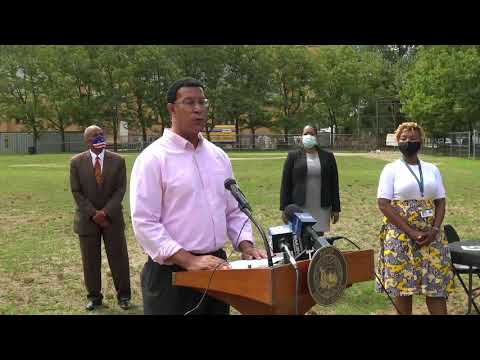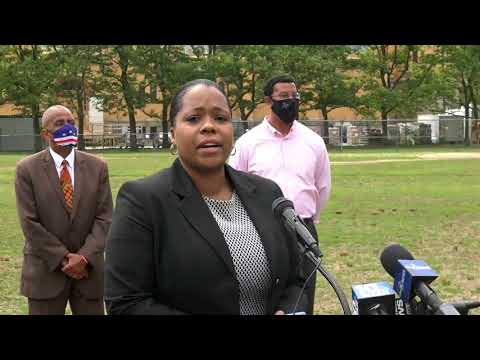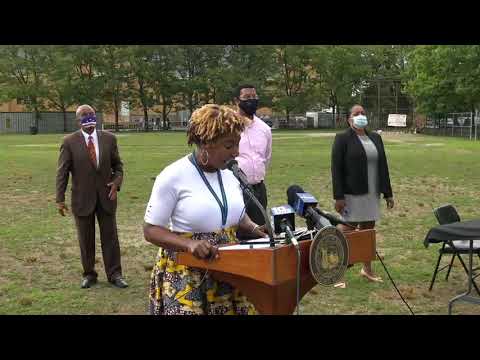Providence announces Truth, Reconciliation and Reparations process
“The reconciliation process will allow us to look at ourselves with clear eyes, and match our highest ideals of who we want to be with the reality of the ground,” said Mayor Elorza. “My sense is that we’ll find that we have a long way to go to meet those high ideals. I believe in a fundamental goodness that exists
July 15, 2020, 4:24 pm
By Steve Ahlquist
“The reconciliation process will allow us to look at ourselves with clear eyes, and match our highest ideals of who we want to be with the reality of the ground,” said Mayor Elorza. “My sense is that we’ll find that we have a long way to go to meet those high ideals. I believe in a fundamental goodness that exists in all of us, and when confronted with the reality of the systematic injustices that our Black community has faced, our broader community will respond to be part of the solution.“
Mayor Jorge Elorza today joined 1696 Heritage Group Vice President Keith Stokes, Founder and CEO of Impact RI Janice Falconer, Community Relations Advisor Shawndell Burney-Speaks and community members to announce and sign a community-driven Executive Order committing Providence to a process of truth, reconciliation and municipal reparations for Black, Indigenous People, and People of Color in Providence.
“As a country and a community, we owe a debt to our Black, Indigenous People, and People of Color, and on the local level, we are using this opportunity to correct a wrong,” said Mayor Elorza. “Though this does not undo history it is the first step in accepting the role Providence and Rhode Island has held in generations of pain and violence against these residents, healing some of the deepest wounds our country faces today. May this process of truth bring us education and awareness of these wrong-doings and may our reconciliation change the systems that continue to oppress our communities, while reaffirming our commitment to building a brighter, more inclusive future.”
According to a press release, through this Executive Order, the City is committed to advancing a social justice process that works in three parts. First, the City will work to identify the Truth by examining the role of the State of Rhode Island and the City of Providence in supporting the institution of slavery, the genocide of Indigenous People, forced assimilation, and seizure of land, among other polices. As part of this first step, local and state laws will be reviewed. This will include a review of all other forms of public and private sector discrimination against people of African or Indigenous heritage and their descendants up to the present day.
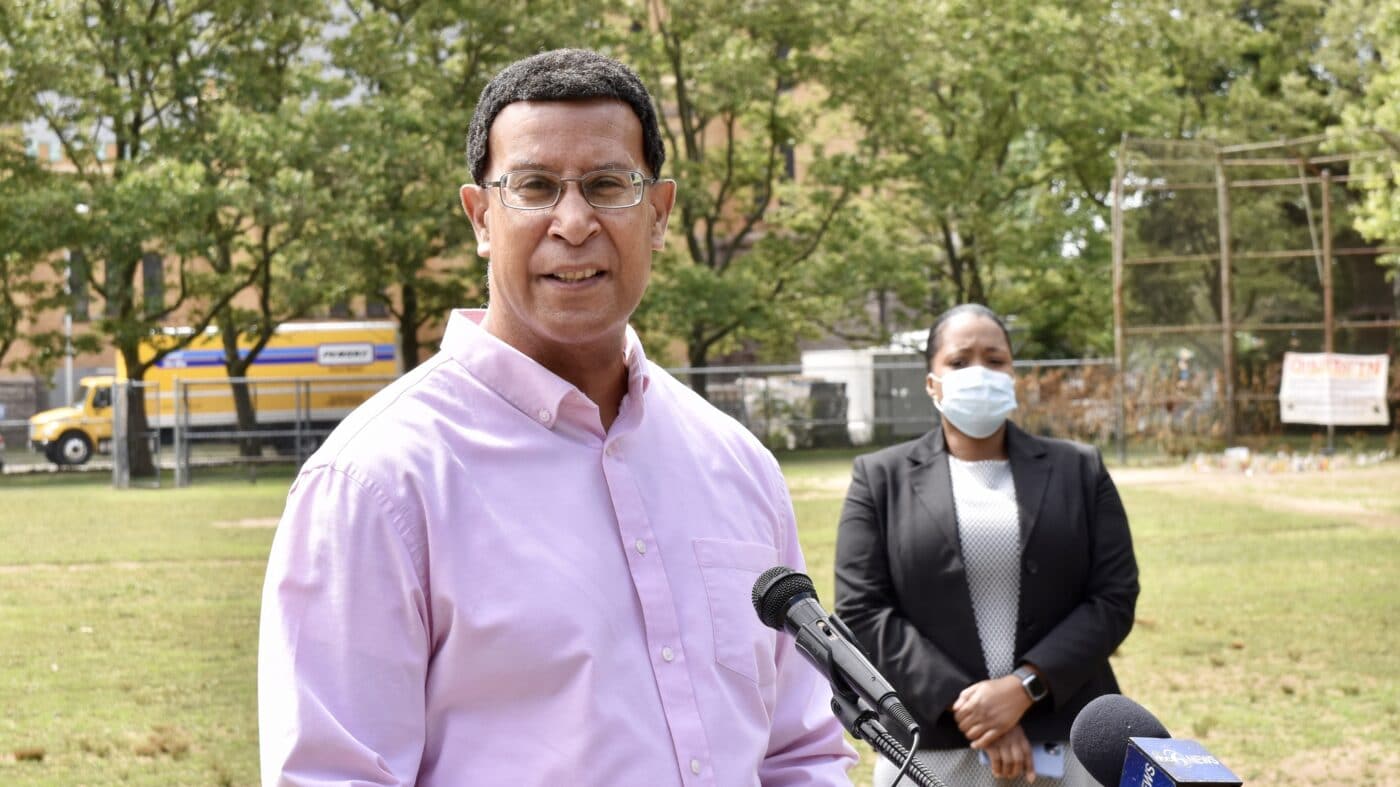
“Providence can lead the nation on how we present the inclusive history of all Americans through public memorials, public investments and public education,” said 1696 Heritage Group Vice President Keith Stokes.
Stokes provided 12 “very simple historic reference points that begin to provide the factual platform of how Africans arrived, survived and thrived in Providence and here in Rhode island.”
These points, said Stokes, form the very basis of truth telling and reconciliation and eventually reparations that the Mayor’s vision has brought before us.”
These reference points include:
- The Trans-Atlantic Slave Trade from Africa to the New World might well have been the largest and longest maritime migration in history. The reason for this world-wide maritime movement was to obtain African enslaved labor to replace the decimated indigenous labor to harvest the cash crops that would make European kingdoms, countries, and families wealthy beyond imagination.
- As Rhode Island became the first American Colony to declare its independence from Great Britain on May 4, 1776, it was also one of the most active slave ports in British North America led by Newport, Bristol, and Providence.
- Between 1705 and 1805, Rhode Island merchants in Providence, Newport and Bristol participated in over 900 documented slave voyages to West Africa directly transporting over 100,000 captive Africans back to largely the West Indies and in some cases back to Rhode Island.
“What stands out about the enslavement of African people in the Americas as compared to slavery throughout world history is the unique concept of confining slavery to a single race and that children of enslaved mothers were born into slavery to serve for the remainder of their lives,” said Stokes. “This brutal system of inheritable servitude impacted the lives of tens of millions of displaced Africans and dramatically shaped the settlement and formation of the Americas and emerging cities like Providence.
- Despite arriving enslaved, Africans would soon become a vital part of the earliest settlement of Providence greatly influencing the city’s economic, religious, and civic origins.
- Their “Creative Survival” as coined by the Rhode Island Black Heritage Society over 30 years ago, speaks directly to the resiliency of African heritage people then and today.
“So, let me briefly introduce you to the some of the African heritage leaders of early Providence,” continued Stokes “remembering [that] Slavery is not Black History. How our African heritage ancestors survived and thrived despite enslavement is Black History.”
- By 1790, 475 people of African heritage lived in Providence, 427 of them free people and 48 enslaved, the majority living in two census districts on the East Side.
- African heritage men and women in early Providence created institutions to serve their community. The Providence Free African Union Society, a mutual aid organization, was organized in 1794, and at least five men who lived on College Hill—London Spear, William Stober, Bonner Brown, Cudge Brown, and Bristol Olney were members.
- The Free African Union Society would evolve into the African Union Meeting House and School, built between 1819 and 1821 at the northeast corner of Congdon and Meeting Streets. Known today as the Congdon Street Baptist Church, the first and oldest Black Church in Rhode Island.
- In his 1883 memoir, William J. Brown stated that “the area near the intersection of Meeting and Congdon Streets served as one of the town’s first African heritage neighborhoods.
- One of Providence’s earliest African Heritage civil rights leaders is Ichabod Northrup, A leader in in fight to desegregate Rhode Island public schools, Northup lived at 15 Cushing Street through at least 1865.
- Leaders like Alfred Niger and George Willis of Providence would represent Rhode Island in the first “American Society of Free Persons of Colour Convention” in 1831 Philadelphia. This convention was held due to the number of race riots breaking out across the Northeast, including two in Providence within the Snowtown and Hardscrabble neighborhoods. Niger and Willis would also co-chair the Providence Committee Against the American Colonization Society.
- Today we stand upon the Dexter Training Grounds, given to the City of Providence by Ebenezer Knight Dexter, but how many know that the 14th Rhode Island Heavy Artillery Regiment, the first African heritage regiment from Rhode Island to serve in the Civil War, trained at this very spot. Ironically, where are the statues or memorials to recognize the history of these brave men of color?
“Today, a challenge facing African heritage people in Providence and across America is not only overt racism, but also invisibility,” said Stokes. “Far too much Rhode Island and American history is taught, interpreted, and memorialized through the ‘owner’s class’ viewpoint. Confederate memorials and statues that celebrate those that secured fame through racial oppression is not the history of America that the growing majority will tolerate any longer. Rather than only taking statues down and removing state names, we should also be advancing African heritage and history in our public schools and reclaiming public spaces that include memorials that represent all the people.”
Stokes recommended this link to the 1696 Heritage Group for more information.
In his press release, Elorza opined that, “Providence and Rhode Island can lead the nation on how we tell the inclusive history of all Americans through public memorials, public investments, and public education. The Truth telling that begins today with the mayor’s executive order not only validates our earned African heritage and history in Providence, but most importantly, that as Black Lives Matter, so does Black History Matter.”
Once the collection of Truth is completed, findings will be used to begin the process of Reconciliation. Residents, organizations and institutions will be engaged in discussing these Truths, with the aim of appreciating the resiliency of the Black, Indigenous People and People of Color in Providence and to better understand the ways these injustices continue to impact residents today.

“And ye shall know the truth, and the truth shall make you free,” said Founder and CEO of Impact RI Janice Falconer, reciting Bible passage John 8:32. “When will we know the truth? When will we be set free? No one knows the answer. However, I am very grateful that the Honorable Jorge Elorza, Mayor of this great City, is committed to uncovering the truth and addressing the centuries of institutional and systemic racial bias affecting Black, Indigenous, People of Color.”
Falconer is a candidate for the District 13 House seat.
Through the last step of this process, Reparations, the City will take measures to reverse the injuries resulting from the Truth findings and advise what appropriate policies, programs, and projects may be executed based on recommendations that accomplish this mission. These will also work to address local laws and policies that continue negatively impact Black, Indigenous People, and People of Color in Providence.
This process was developed with and crafted by the Mayor’s African American Ambassador Group, which meets weekly and serves as a direct line of communication between the community and the Administration. What originally began as a means to ensure equitable access to COVID-19-related care and resources has since expanded, establishing subcommittees focused on recommending strategies to increase equity citywide and most recently developed the Executive Order removing the term “plantations” from all City documents and oath ceremonies.
The announcement was hosted at Dexter Park and Training Grounds, a nine-acre park donated by Ebenezer Knight Dexter for military purposes that played a key role in the Dorr Rebellion, the Civil War and World War I. The 14th Rhode Island Heavy Artillery, who used these training grounds, was the first Black company from Rhode Island to serve in the Civil War, recruiting at least 1,800 soldiers from Rhode Island and surrounding states such as Connecticut and New York.
Those interested in engaging in the subcommittees of the Mayor’s African American Ambassador Group are encouraged to contact Community Relations Advisor Shawndell Burney-Speaks at [email protected].
